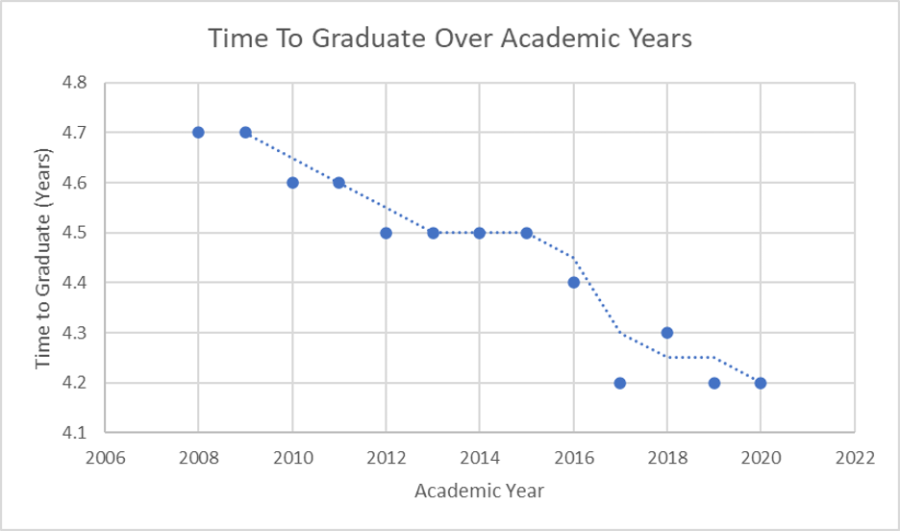UNC Asheville time to graduate beats the average
This graph shows the average time to graduate at UNC Asheville has decreased within the past 12 years.
September 21, 2022
According to National Student Clearinghouse data, UNC Asheville beats the average time to graduate. UNCA advising shows how and why.
“What I find interesting is that the majority of students who end up graduating, do it in four years,” said Jeffery Konz, director of institutional research.
In a study published Aug. 2 by the National Student Clearinghouse, less than a third of students were able to earn more than 30 credits to qualify as a sophomore going into their second year and over half of students only received 24.
According to the National Student Clearinghouse, full-time students will, on average, not take enough credits during their college semesters. When students are taking an appropriate amount of credits, those students will only receive 75% of the credits taken.
The data given by the department of institutional research shows that UNCA is decreasing the amount of time a student will spend studying at the university.
Konz said this steady decrease can be attributed to an increase in transfered credits, even for first-time students. Over the past decade the average first-time student comes to the university with 12 credits nearly a semester. The average transfer student comes to the university with 50-60 credits.
Student Success Specialist Grayson Randall said the advising office has been steady at work with students, taking a hands-on approach and involving themselves in more of a student’s life than just their academics when they need to go to advising for help.
“It’s very much a dialogue with the student to see what’s going to be the best fit for them per semester,” Randall said. “I’m not going to work with a student and tell them they need to get 15 or 16 hours.”
According to Randall the advising office strives forward to a more wrap-around, holistic approach to interacting with students. The office’s main goal will be to deepen relationships with students and help them understand that sometimes, it’s understandable to drop hours or take a little extra time to graduate in order to avoid burnout.
Students, especially within the chaos of the pandemic, don’t want to put too much pressure on themselves. Dropping classes always has the chance to lengthen a student’s time with UNCA, but advisers like Randall are always giving students options like completing in a longer time or taking summer classes with the university.
“I think students are more understanding,” Randall said. “It’s okay if you need to drop your hours to have it fit in with your life better and not burn yourself out.”
This wrap-around holistic advising isn’t going to be pushed onto faculty advisors. They are already busy teaching, conducting research or sticking to their campus obligations. Randall said that their department is always here to provide additional support for students who may need it.
According to Mark Harvey, professor and chair of psychology, with all of those responsibilities, he often turns to the academic success center and encourages his students to use their resources for their own benefit.
Harvey said he gives no strict graduation timeline to the students he advises. He’ll often do the math with them as guidance, telling them clearly that 15 credits-per-semester keeps them on track.
“The average is more than four years,” said Harvey. “Some students, for a variety of reasons, are on a slower plan; some students are on a more accelerated plan.”


















